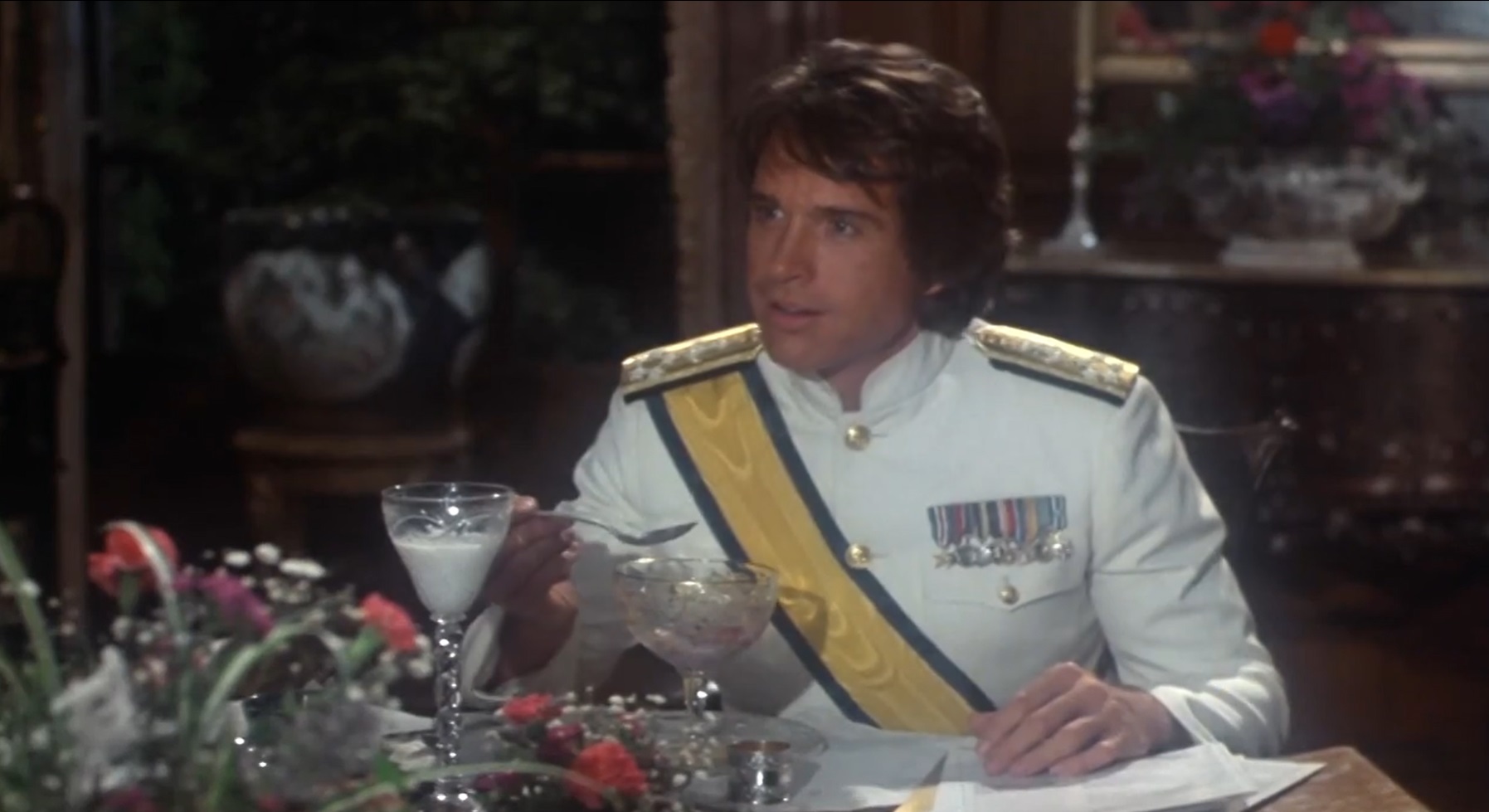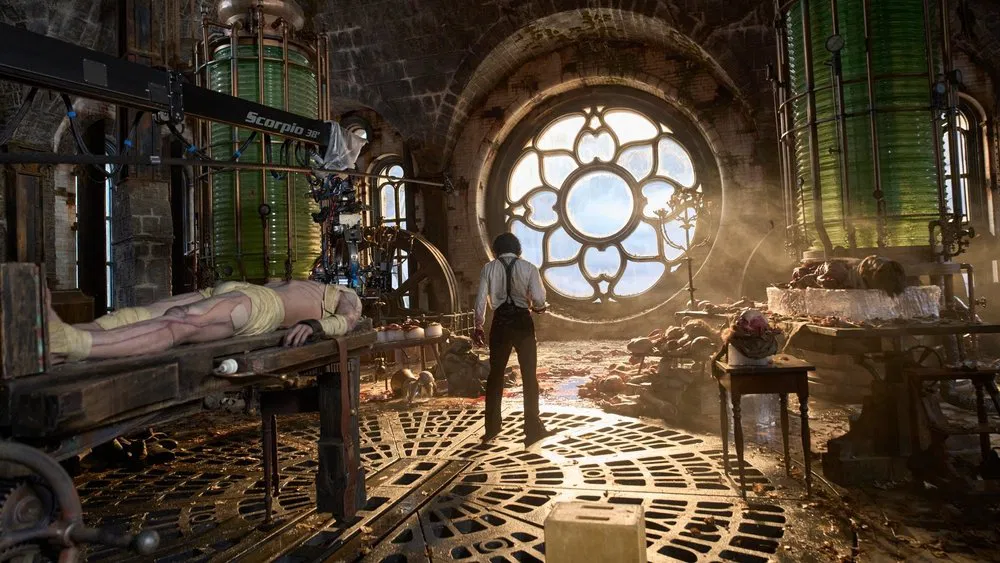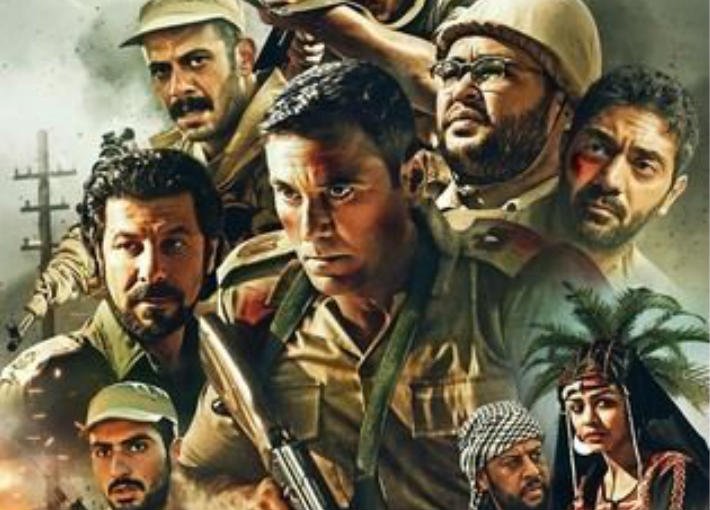
By Emad El-Din Aysha, PhD
I haven’t been to a movie theatre for quite a while now, let alone to watch an Arabic movie. But, I couldn’t resist this time, with Sherif Arafa’s Al-Mamar (or The Passage) portraying one of those sadly forgotten battles during the war of attrition between Egypt and Israel (1967 to 1970). Fortunately a friend of mine had celebrated his birthday, quite belatedly, so I insisted on inviting him so we could watch the movie together, with me footing the bill!
A Look in the Mirror
The movie begins with the crushing defeat of 1967, introducing you to several of the key characters and their own separate stories as they try to survive the aftermath. There is Nour (Ahmed Ezz), the erstwhile hero who is charged with the military mission targeting the Israel base in Sinai. There is Mahmoud (Ahmed Falawkas), a captured army officer who refuses to cooperate with the villain in the story, the sadistic Israeli officer played by Eyad Nassar. There are also their friends and relatives and other characters who get sucked into the vortex, such as the hapless photojournalist named Ihsan (Ahmed Rizk) who is sent on the mission too.
Behind the scenes, however, this is all meant to expose weak points in the way Arabs do things, and rightfully so if you ask me. In the opening sequence you have the Israeli war cabinet studying intelligence reports about Egypt and their intentions and preparedness, or lack of preparedness, for war, and they have a clip of Um Khalthoum singing and how she is performing in a completely different way than ever before – proving that she’s been instructed to psyche everyone up for war. Then the option of repeating what had happened in 1956 is put forward and Dayan is thanked for his correct observation that the Arabs don’t learn from their mistakes. (This is a reference to the famous Israeli saying, I think by Ben-Gurion, that Arabs don’t read history and if they do they don’t understand what they’ve read, and if they do understand it they forget it!) Then you see air reconnaissance photos of Egyptian airfields and how unguarded they are – no concrete bunkers to protect them from an air strike. (They also know about the state of morale of Egyptian soldiers given the squabble between Abd Al-Nasser and Abdel Hakim Amer). And so the decision is made to launch a sneak attack to knock out the Egyptian airforce and advance on Sinai.
This is contrasted to the initial Egyptian position, in the Sinai desert, of having no clear orders or plan, with the reserve army being sent in unprepared and still in their civilian clothing, and how all of this is really just for show, to keep the Israelis on guard because of the situation on the Syrian front. (When the real fighting begins they get the order to withdraw, again because they haven’t got a proper escape plan and haven’t assessed the successes as well as the failures of the situation). Later in the movie, when the Egyptian special forces have completed their mission and are hiding out in a deserted town, Nour explains that the Israelis don’t rush into things and they will take their time on launching an appropriate response, which means they as Egyptians have to be prepared for whatever may come. And they are, thank heavens, proving that a handful of men, armed and mobile and well hidden, can take on tanks and infantry and win. Its’ all a question of preparedness and that includes understanding the enemy and speaking his language, which Nour does.
You can also see this in an earlier scene where Nour is scolding one of his soldiers, a sniper (Muhammad Farag), who stood up to an Israeli fighter jet, firing away at it. Nour admires his bravery and desire for revenge but tells him that isn’t enough. What got the army into this fix to begin with was blustering and talking big without preparation, without scientific planning in effect.
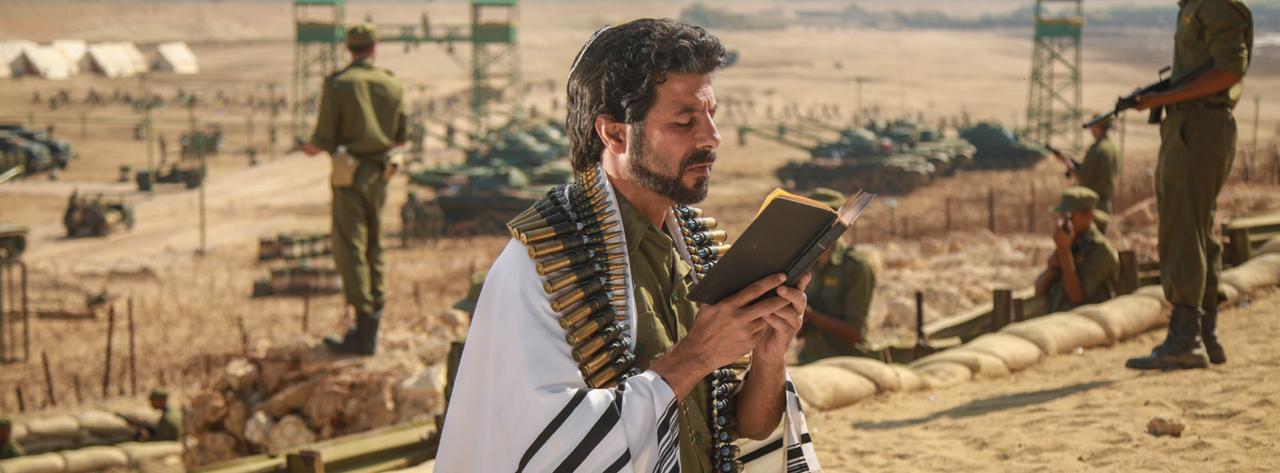
A lot of this is directed at the situation today, mind you. In a key scene where Nour is talking to his loving son, a cute kid with glasses, he tells him that it is through science and love that we will rebuild our country. There’s also the Bedouins in Sinai who work with the Egyptian forces, illustrating how patriotic they really are and how willing they are to fight for their own belongings against the Israelis, with many tongue-in-cheek messages about unity. (The scene where Eyad Nassar is talking to the Bedouin chiefs and apologising to them for gathering them all here instead of coming to them in person is, you feel, a reference to how cooperative the Arab states are with the Israelis nowadays – because the Israelis are smart and know how to sweet talk them). The scene where Eyad Nassar is killing Egyptian officers that cooperated with him is meant to show that there’s simply no compromising with this enemy and the plight of Mahmoud and his officers is like that of the Palestinians under occupation.
Hend Sabri’s role as the dutiful wife that stands behind her man, Nour, is meant to highlight the feminine ideal as Sherif Arafa sees it. Independent, educated, attractive, enamoured with her own romantic dreams, and also a traditional good mother and wife. (Their apartment has a 1950s suburban American feel to it, especially with the knife and fork and the neatly arranged food on the dinner table. There’s also a strong nostalgic arch in the movie, with 1960s Egypt on display, with cabaret and clean and empty streets, and men with hairstyles and clothes from nowadays for some reason). The same goes for the Bedouin girl played quite nicely by the very talented young starlet Asma Abu al-Yazid. There are some annoying scenes in the early chunk of the film, mind you, before the action gets going, such as Ahmed Ezz showing off his muscles all the time and the annoying shower scene. (He only seems to behave himself when directed by Sandra Nashat, and she’s just as good with a cameras as Sherif Arafa if you ask me). There’s also the fight scene where you have clerics from Al-Azhar going with the flow. The photojournalist Ihsan, as my friend correctly pointed out, is a reference to the intellectual class – ‘Ihsan’ Abd Al-Qudus – and how they are letting the country down, since he hitches up with some vulgar belly dancers in an effort to make money.
Still with all of that it’s a superb movie that takes war movies to a whole new level while also giving it a distinctly Egyptian touch, with the father-son relationship and the sentimentalities on display and the personal stories of the participants. Not to forget the touching but action-packed movie score helmed by Omar Khayrat as well.
The Proof in the Pudding
This movie has been a long time coming. We’ve been waiting, for ages and ages, for a big military movie about the October War, and the usual excuse has been that the special effects would cost too much. (We’ve been waiting for an SF movie for a long time too, with the same set of excuses). CGI has put a lie to this claim, evidenced by the airstrike sequence with the Israeli mirage jets bombing and machine gunning Egyptian soldiers. It was so well done in fact you thought they’d actually rented these planes for the film!
I presume it was all computer graphics but it was very well done graphics at that. Same with the tank explosions from the RPG strikes. The fact that they had tanks at all, Egyptian or Israeli, proves they could muster the finances for the project, putting the lie again to the naysayers who said such a movie couldn’t be made. I’m not a ‘big’ fan of Sherif Arafa and still prefer his older comedy movies with Adel Imam but his visual style was perfect for this movie. The expanse of Sinai, desert and hills, and just how beautiful and desolate it is was really brought out by the movie. The explosions, especially in the night attack, are charismatic, both visually beautiful and quite visceral in their immediateness. Again, it just goes to show what Egyptians and Arabs are capable of if they put their minds to it and are given the opportunity to outdo themselves, and others.
Watching the battle sequence at the deserted town, you got the distinct impression Sherif Arafa was going through his cinematic library and modelling scenes on scenes in an effort specifically to outdo the West at its own game. The scene where the sniper is firing away and taking out many an Israeli soldier, only to have a tank point its cannon at him in a desperation move, looks very much like a scene in Saving Private Ryan (1998). Nonetheless, the Egyptian hero-sniper survives in the end, unlike the American dude. There’s also a standoff scene inside a building, with the Israeli bad guy and another soldier are hiding behind pillars while it is the Egyptians that are waiting for the other side to make the wrong move. This is like a scene in an annoying Entebbe movie starring Charles Bronson, portraying the Palestinians as incompetent and cowardly while the Israelis are coldly calculating, but in reverse. Finally, you feel the whole battle sequence was modelled, ultimately on the Palestinian experiences in the occupied territories, with Molotov cocktails being used to great effect against a technologically superior enemy, stuck in tight quarters.
It all serves the purpose of exposing the Israelis for what they really are. Human beings, just as vulnerable and capable of error as the rest of us. (It also tells you the kind of damage the Palestinians could really inflict on the Israelis if they were armed properly). I was reading a WWII novel the other day, set in the Caucuses, with the British SAS helping the Russian partisans against the Germans and the Russians really out-do themselves, finding ways to take on panzer tanks like pouring battery acid down the canons. And a ploy used by the SAS, digging tunnels under the battlefield to place mines underneath the German tanks, was something that was essentially done by the Moroccans under the leadership of Abd Al-Karim Al-Khitabi in the country’s wars of national independence. Che Guevara actually visited Egypt to meet the great man and learn from him!
Asking Intelligence Questions
I want to take a detour here and mention some things related to both the 1967 war and the October War that are still lingering in the air. Concerning 1967 there is the question of what exactly happened to the USS Liberty and what role it played in the war. I chanced on a documentary movie on Youtube the other day, USS Liberty: Dead In The Water (2002), and by the BBC no less. There’s no definitive answers given there as to what exactly the Liberty was doing at the time and why it was deliberately targeted, and it was deliberately targeted, but you found out terrible things about what ‘almost’ happened and may have been meant to happen at the time. The American fleet in the Mediterranean launched bombers with a nuclear payload, headed for Cairo, thinking that Egypt had attacked the US intelligence vessel. (It was off the coast of Gaza, after all). You also found proof positive that the Americans were in on the 1967 war itself.
There are famous photos of Egyptian airfields and fighters and bombers destroyed on the ground, we’ve all seen them before. What we didn’t know is that the high res photos weren’t taken by Israeli jets but by American aerial reconnaissance. So the Americans were directly involved in both the planning and actual conduct of the war. A word that got batted around in the documentary as well was ‘Operation Cyanide’, which the USS Liberty was directly involved with. Some secret underwater communications system they were going to use to help out the Israelis with in the event of a war, relying on American submarines. The Egyptians have long claimed that the reason the Israelis were able to break their cipher codes and mess up their communications and radar during the 1967 war was specifically the USS Liberty, and that may very well be the case. Contrast this to the October War where all our electronic systems were completely secure, and there was no American vessel in sight. (The Yanks weren’t about to make that mistake twice, were they!)
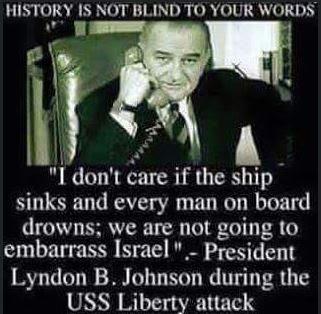
That still doesn’t exonerate the Egyptian war planners in 1967, mind you; because they should have known America wasn’t going to leave its ally to fend for itself, even on the electronic front. As for the October War, I’d also recently watched a very sedated Israeli movie, also on Youtube, I think called Silent Sirens. (It was in Hebrew and the translation in Arabic). In it they go over the ten days before the war and all the Israeli intelligence failures. You have King Hussein making a trip to Israel in the middle of the night by helicopter and telling Golda Meir point blank that the Syrians and Egyptians are planning a war and that he wants nothing of it. Then an Israeli spy confirming this information. Then aerial reconnaissance clearly showing Egyptian troop and armour movements, and the families of the Soviet advisors being pulled out.
Then finally a meeting, in a public place, between the Mossad chief and an Egyptian source codenamed ‘Pavel’, whom we all presume is Ashraf Marwan. But he doesn’t look anything like him, a fat oaf of a man, and he’s not meeting in some closed room away from prying eyes as Marwan is supposed to have done. So I suppose that settles that then, if you ask me.
Even if Ashraf Marwan was working for them, he wasn’t the master spy and it could be their historians are confusing several different sources with each other. Look a little closer at the movie and you notice some other things. There are lots of women in Israeli military intelligence, but they all have desk jobs, listening in on radio intercepts and doing translation work. And they’re quote pretty too. You ‘feel’ they’re being kept out of harm’s way, maybe not out of any sense of chivalry or discrimination but as breeding vessels for the future. (Wise thinking if you ask me). There’s also the head of Israeli military intelligence, the main person responsible for the cock-up in the war, always misreading the evidence. In one key scene he says you can never rest in this country. (He looks like he has a stomach ulcer).
It seems the reason the military messed up in its reading of Arab intentions and capabilities is that they wanted to believe that there would be no war and so could finally go to sleep peacefully at night. Are they suffering from war fatigue? Is their state of being getting to them? In another scene of self-reflection you have the main whistleblower in the movie, a lowly officer nobody takes seriously, explain that Sadat must go to war because he is a peasant by upbringing, and so ever grain of soil for him is ‘holy’. Does this mean that they understand that their existence here is always jeopardised and so a final showdown is inevitable. Who knows?
But it just goes to show that we need to study their movies and art and music just as they study ours. Hence, the war cabinet and the Um Khalthoum clip in Al-Mamar. Not to forget Mr Ihsan, and how he does actually think up a good idea while they’re on their secret mission, proving that the media and the intellectuals can and should actually be allowed to participate in the decision-making process. We desperately need to upgrade our soft power apparatus and this movie is the first step in that direction.
What is more, objectivity is called for. The Eyad Nassar character is about as reprehensible as can be, but he’s smart and capable and not a coward, preferring to die than be captured by the Egyptians. For a long time now we have almost stopped making proper spy sagas, like Rafaat Al-Hagaan, which give a very accurate and nuanced portrayal of Israeli society from an insider’s perspective. And something that bothered the Israelis about Adel Imam’s Firkat Nagui Atallah, is how it exposed (as in the silent sirens movie) how stressed out Israelis are about living in such a hostile neighbourhood. Therefore, just as the Israelis brag about how well they understand us, we have to do the same. Not just understand them but make it evident to them that we understand them, and in high-quality movies targeted at the international marketplace that expose their lies and brutality.
Al-Mamar, for all its minor flaws, is the way to go if we are to freak them out of their minds and make some money along the way. Oh, I should mention that my friend bought me dinner afterwards as a thank you for the cinema tickets, and at a Syrian restaurant!!




